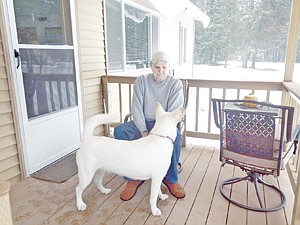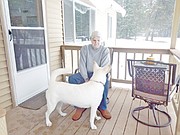Speaking From Experience
Bob Hanley is 61 years old.
He only reached that age by giving up alcohol more than 15 years ago.
“I’d have been dead a long time ago,” the ex-addiction counselor said. “I quit smoking before I quit drinking. That’s the kind of alcoholic I was. It was literally killing me, slowly.”
Hanley said he hasn’t touched a drop of alcohol since June 15, 1997, when he voluntarily checked into a treatment center in Tucson, Ariz.
Retiring last year because of complications with back surgery, Hanley spent eight years working with drug addicts in Northwest Montana, first in his adopted hometown of Kalispell, then in Libby.
Alcohol, Hanley is quick to remind, is a drug, and alcoholism is a genetic disease.
Although he doesn’t open up about his past to many people, he agreed to it for this interview, particularly considering how addiction affects Montana.
The statistics are staggering.
Montana ranks ninth in overall alcohol consumption among women aged 18-44, according to the Centers for Disease Control, with 58.3 percent of women imbibing at least once a month. The national average is 51.2 percent.
The state is tied for 12th in binge drinking, defined as four or more drinks on one occasion, with 17 percent of the population binging.
More than 10 percent of Montanans had used an illicit drug in the past month, according to a 2007 White House study, one of the 10 highest in the country. As a direct result of drug use, 132 persons died in Montana in 2007.
“At any time, 10 percent of the national population has a problem with alcohol,” Hanley said. “Addiction is not going away.”
Hanley first drank when he was in seventh grade. He first got drunk when he was 16. His mother was an alcoholic who abused him, driving him to find solace in a bottle.
“I watched her deteriorate and go on her lifelong path with alcohol,” he said. “If you come from an alcoholic home, you stand a four times better chance of having a problem with alcohol.”
At the “lowest” part of his 30-year drinking career, he was drinking 18 to 20 beers a night. Every night.
“I was a functioning alcoholic,” he said. “I never missed work, I never drank on the job. But as soon as I got off work, I knew where my first beer was going to be.”
He divorced his wife in 1988, and she left with his two sons, 10 and 7 years old.
“They were getting in the way of my drinking,” he said.
His sons drank while attending Troy High School, but Hanley counts his blessings that they escaped the stranglehold of addiction.
After leaving his 30-day treatment in Tucson, it was Saturday, July 6, 1997. Hanley drove around, listening to music in his car, contemplating his new life.
“You have to learn everything all over,” he said. “For 30 years, everything in my life had revolved around alcohol. Relearning is probably the hardest thing they’ll ever have to do.”
After kicking his addiction, he left his hated Arizona, where he was working for a mining company, and moved to Kalispell, where he began getting a degree in counseling from Flathead Valley Community College.
He purchased land in Libby in 2001, just to have a place to put his name to. His first job, though, was working with patients in Kalispell.
When the Chemical Dependency Clinic expanded, he applied for the new position in Libby and got it.
Until his retirement, Hanley guessed he must have worked with more than 500 patients.
While he had successes, the times he couldn’t help someone stuck with him more.
“The hard part for us was when someone died,” he said. “Whether that be from overdose, crashing their car or suicide. I don’t know how many people I worked with killed themselves. One is too many.”
Even so, drug and alcohol counselors play an important role to a vulnerable population. The average length of a counselor’s career is just two years.
Hanley has his significant other, Winnie – another person who beat addiction – and his two dogs, Dory and Gabby, to keep him company at his home across the river.
He’d still like to be helping addicts, but his back pain makes that impossible.
Hanley wanted to pass along some advice for those who may be struggling.
“If you think you have a problem with drugs or alcohol, you do,” he said. “Otherwise you wouldn’t have thought that.
“The disease begins without them really knowing it. It’s sad that people can’t ask for help. If they want help, help is there.”




